Joe Biden declares ‘America will not default,’ says he’s confident of budget deal with GOP lawmakers
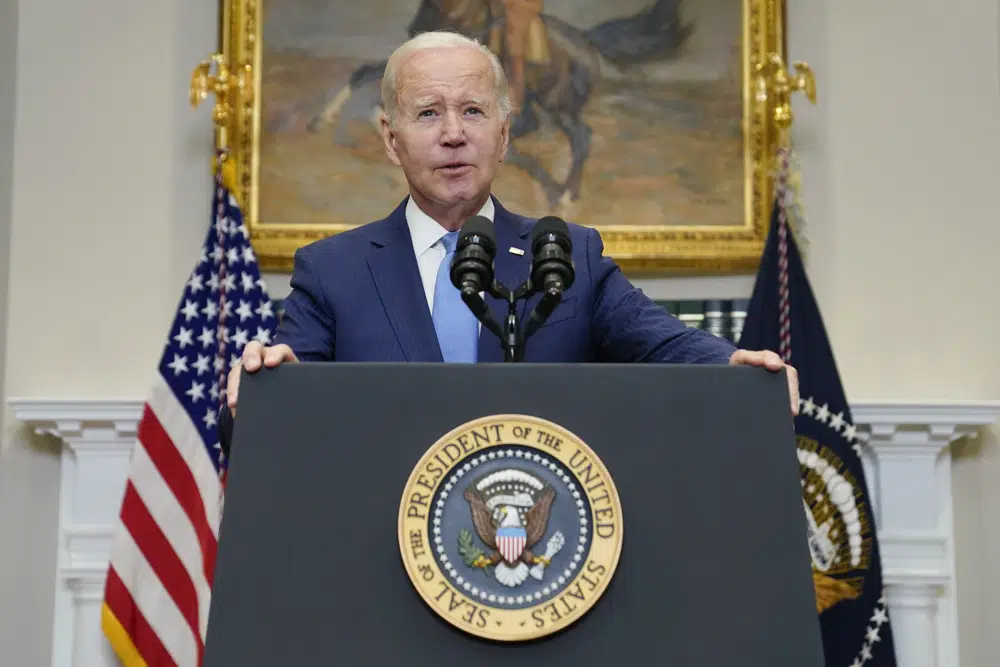
An optimistic President Joe Biden declared Wednesday he is confident the U.S. will avoid an unprecedented and potentially catastrophic debt default, saying talks with congressional Republicans have been productive. He left for a G-7 summit in Japan but planned to return by the weekend in hopes of approving a solid agreement. Biden’s upbeat remarks came as a select group of negotiators began meeting to try and hammer out the final contours of a budget spending deal to unlock a path for raising the debt limit as soon as June 1. That is when the Treasury Department says the U.S. could begin defaulting on its obligations and trigger financial chaos. “I’m confident that we’ll get the agreement on the budget, and America will not default,” Biden said from the Roosevelt Room of the White House. Later Wednesday evening, negotiations resumed behind closed doors at the Capitol. Democrat Biden and Republican House Speaker Kevin McCarthy have traded blame for a debt-ceiling impasse for weeks. But Biden said of the latest White House session with congressional leaders that “everyone came to the meeting, I think, in good faith.” McCarthy was upbeat, too, though contending Biden had given ground. The president said the budget talks were still separate from the debt limit issue, but the speaker said Biden had “finally backed off” his refusal to negotiate. “Keep working — we’ll work again tonight,” McCarthy told reporters later. “We’re going to work until we can get it done.” Biden said that every leader at Tuesday’s Oval Office meeting — Vice President Kamala Harris, McCarthy, House Minority Leader Hakeem Jeffries, D-N.Y., Senate Majority Leader Chuck Schumer, D-N.Y., and Senate Minority Leader Mitch McConnell, R-Ky. — agreed the U.S. must not default on its obligations. “It would be catastrophic for the American economy and the American people if we didn’t pay our bills,” Biden said. “I’m confident everyone in the room agreed … that we’re going to come together because there’s no alternative. We have to do the right thing for the country. We have to move on.” He said he would be in “constant contact” with White House officials while at the summit in Hiroshima. He is canceling stops in Australia and Papua New Guinea that were to follow so he can return to Washington on Sunday. Biden and McCarthy tasked a handful of representatives to work swiftly to try and close out a final deal. They include Steve Ricchetti, counselor to the president; legislative affairs director Louisa Terrell and Office of Management and Budget Director Shalanda Young for the administration, and Rep. Garret Graves, R-La., a close McCarthy ally, for the Republicans. McCarthy, who has said he would personally be involved, said he planned to stop by the talks later Wednesday. He said he would be in Washington for the weekend while negotiations are underway. Agreement by the negotiators would still leave any deal needing approval by Democratic Senate and Republican House. Democrats are upset about the possibility of new work requirements for some recipients of government aid. And Republicans want much tougher budget restraints than the Democrats support. The positive comments by Biden and McCarthy suggest they believe they can gain the backing of their parties’ lawmakers. McCarthy was flanked Wednesday on the Capitol steps by some of the most conservative Republicans from the House and Senate in a feisty show of support. The national debt currently stands at $31.4 trillion. An increase in the debt limit would not authorize new federal spending; it would only allow for borrowing to pay for what Congress has already approved. The contours of an agreement have begun to take shape, but the details of spending cuts and policy changes will make or break whether the divided Congress can strike a bipartisan deal with the White House. In exchange for lifting the debt limit to keep paying the bills, newly majority House Republicans are trying to extract steep budget caps of no more than 1% growth a year over the next decade, alongside bolstered work requirements. Negotiators are preparing to claw back some $30 billion of unspent COVID-19 aid, now that the government has lifted the pandemic emergency. And they are working on a potential agreement for permit changes that would speed the development of energy projects that both Republicans and Democrats want, though the details remain daunting. But Democrats are not at all willing to accept the 10-year cap on spending that Republicans approved in their own House bill, and the Democrats are instead pushing for a shorter window of budget cuts. Biden is facing fierce blowback from progressive Democrats after he opened the door to tougher work requirements. But he insisted Wednesday any new work requirements would be of “no consequence” and that he’s not willing to impact health programs, presumably referring to Medicaid. Asked about that, the Republicans behind McCarthy — who support more work requirements on Medicaid, food stamps, and cash assistance programs — broke out in laughter at the Capitol. The Republicans scoffed aloud as helicopters with the presumably departing Biden flew overhead. McCarthy, who depended on Donald Trump’s backing to become the new speaker, still has work to do to keep his narrow House majority in line for any final deal, particularly among the hardline Freedom Caucus conservatives who almost blocked his election earlier this year for the gavel. Former President Trump has encouraged Republicans to “do a default” if they don’t get everything they want from Biden. “Bipartisanship is needed,” Schumer said Wednesday. “It’s the only way to go.” As backup on Wednesday, House Democratic leader Hakeem Jeffries launched a process that would force a vote on raising the debt limit. It’s a cumbersome legislative discharge procedure, but Jeffries urged House Democrats to sign on to the measure in hopes of gathering the 218 majority backers, including Republicans needed to put it in motion. “Emerging from the White House meeting, I am hopeful that a real pathway exists to find an acceptable, bipartisan resolution that prevents a default,” Jeffries said in a letter to colleagues. “However,
Joe Biden scraps planned visit to Australia, Papua New Guinea to focus on debt limit talks
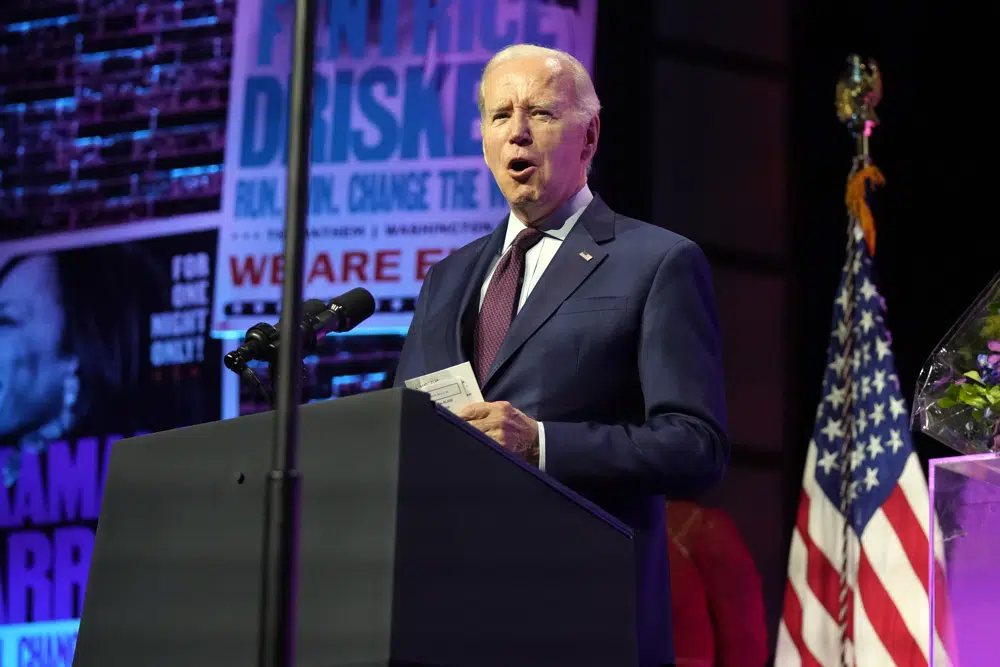
President Joe Biden said Tuesday he’s curtailing his upcoming trip to the Indo-Pacific, scrapping what was to be a historic stop in Papua New Guinea as well as a visit to Australia for a gathering with fellow leaders of the so-called Quad partnership so he can focus on debt limit talks in Washington. The scuttling of two of the three legs of the overseas trip is a foreign policy setback for an administration that has made putting a greater focus on the Pacific region central to its global outreach. Biden said he still plans to depart on Wednesday for Hiroshima, Japan, for a Group of Seven summit with leaders from some of the world’s major economies. He will return to the U.S. on Sunday. “I’m postponing the Australia portion of the trip and my stop in Papua New Guinea in order to be back for the final negotiations with congressional leaders,” Biden said at the start of a Jewish American Heritage Month event at the White House. He added, “The nature of the presidency is addressing many of the critical matters all at once. So I’m confident we’re going to continue to make progress toward avoiding the default and fulfilling America’s responsibility as a leader on the world stage.” Biden said he spoke to Australian Prime Minister Anthony Albanese earlier on Tuesday to inform him he was postponing a visit to Australia and invited him to Washington for an official state visit at a yet-to-be determined date. White House staff broke the news to Papua New Guinea Prime Minister James Marape. White House officials did not offer an immediate response to questions about when Biden might reschedule visits to the two countries. “Revitalizing and reinvigorating our alliances and advancing partnerships like the Quad remains a key priority for the President,” White House press secretary Karine Jean-Pierre said. “This is vital to our ability to advance our foreign policy goals and better promote global stability and prosperity. We look forward to finding other ways to engage with Australia, the Quad, Papua New Guinea, and the leaders of the Pacific Islands Forum in the coming year.” Japanese Prime Minister Fumio Kishida has invited Albanese, Indian Prime Minister Narendra Modi as well as Pacific Island leaders to come to Hiroshima during the G-7. Albanese, in an Australian Broadcasting Corp. interview, said that the Quad leaders are now hoping to hold a meeting in Hiroshima. “We’ll also hopefully be able to find a time when the four of us can sit down,” Albanese said. “We will have to organize the logistics of the Quad meeting now in Sydney, and we’ll be discussing with our partners in the U.S., but also Japan and India over the next day or so.” Biden had been scheduled to travel on to Papua New Guinea to meet with Pacific Island leaders and then to Australia for a meeting of the leaders of the Quad partnership, made up of the U.S., Australia, India, and Japan. The Papua New Guinea stop would have been the first visit by a sitting U.S. president to the island country of more than 9 million people. The Quad partnership first formed during the response to the 2004 Indian Ocean tsunami that killed some 230,000 people. Since coming into office, Biden has tried to reinvigorate the Quad as part of his broader effort to put greater U.S. focus on the Pacific and counter increasing economic and military assertiveness by China in the region. Biden announced his decision soon after he wrapped up a meeting on Tuesday afternoon with Republican House Speaker Kevin McCarthy, Senate Minority Leader Mitch McConnell, R-Ky., Senate Majority Leader Chuck Schumer, D-N.Y., and House Minority Leader Hakeem Jefferies, D-N.Y., for talks on the debt limit standoff. Earlier Tuesday, White House National Security Council spokesman John Kirby expressed administration officials’ frustration that the debt talks are having an impact on the president’s dealings on the international stage. “We wouldn’t have to have this conversation. I wouldn’t have to answer these questions if Congress just did the right thing,” Kirby said. Some Republican lawmakers questioned Biden’s decision to travel overseas considering the consequences of the debt limit talks. “I think he should not leave, and he should focus on the debt limit here at home,” Sen. Rick Scott, R-Fla. With the brief stop in Papua New Guinea to meet with Pacific Island leaders, Biden had hoped to demonstrate that the United States is committed to remaining engaged for the long term in the Pacific Islands. The area has received diminished attention from the U.S. in the aftermath of the Cold War, and China has increasingly filled the vacuum — through increased aid, development, and security cooperation. Biden has said that he’s committed to changing that dynamic. Last September, Biden hosted leaders from more than a dozen Pacific Island countries at the White House, announcing a new strategy to help to assist the region on climate change and maritime security. His administration also recently opened embassies in the Solomon Islands and Tonga, and has plans to open one in Kiribati. As vice president, Biden saw up close how domestic politics can complicate foreign policy during the 2013 government shutdown. President Barack Obama was forced to bail on attending the Asia-Pacific Economic Cooperation summit and the East Asia Summit in Brunei as well as a visit to Malaysia and the Philippines in the midst of a government shutdown as he negotiated with GOP leaders. President Bill Clinton opted to skip his scheduled participation in the APEC summit in Japan in the midst of the 1995 government shutdown. He opted to send Vice President Al Gore in his place. Republished with the permission of The Associated Press.
Rep. Gary Palmer votes on bill to secure U.S. border

U.S. Rep. Gary Palmer released a statement today in support of H.R. 2, the Secure the Border Act of 2023. The bill aims to address issues regarding immigration and border security, including imposing limits to asylum eligibility. “President Biden has had two and a half years to fix the border crisis but has only made excuses,” Rep. Palmer stated. “Today, House Republicans took action to stop the chaos that is currently on display at our southern border. The Secure the Border Act of 2023 delivers on our promise to the American people to secure the border because the safety of our country is our top priority.” Rep. Palmer continued, “The Secure the Border Act of 2023 responds to the failed border policies of the Biden Administration. It funds more border patrol agents, resuming construction on the border wall, and demands transparency from the Department of Homeland Security. The time for talk is over. The President needs to stop willfully neglecting the border crisis and act with the best interest of Americans in mind.” Today, @HouseGOP took action to stop the chaos that is currently on display at our southern border. The Secure the Border Act of 2023 delivers on our promise to the American people to secure the border because the safety of our country is our top priority. pic.twitter.com/s96EL69hO7 — Gary Palmer (@USRepGaryPalmer) May 11, 2023 The bill passed the House just hours before Title 42 expired but is unlikely to pass the Senate. The White House has also stated they will veto the bill. Title 42 is the name of an emergency health authority. The Trump administration implemented it in March 2020 and allowed U.S. officials to turn away migrants who came to the U.S.-Mexico border to prevent the spread of COVID-19. House Speaker Kevin McCarthy called it the “strongest border security bill to come through Congress in more than 100 years.” The legislation would increase penalties for individuals who overstay their visas and increase the number of Border Patrol agents. The bill would: require the Department of Homeland Security (DHS) to resume activities to construct a wall along the U.S.-Mexico border; provides statutory authorization for Operation Stonegarden, which provides grants to law enforcement agencies for certain border security operations; prohibit DHS from processing the entry of non-U.S. nationals (aliens under federal law) arriving between ports of entry; limit asylum eligibility to non-U.S. nationals who arrive in the United States at a port of entry; authorize the removal of a non-U.S. national to a country other than that individual’s country of nationality or last lawful habitual residence, whereas currently, this type of removal may only be to a country that has an agreement with the United States for such removal; expand the types of crimes that may make an individual ineligible for asylum, such as a conviction for driving while intoxicated causing another person’s serious bodily injury or death; authorize DHS to suspend the introduction of certain non-U.S. nationals at an international border if DHS determines that the suspension is necessary to achieve operational control of that border; prohibit states from imposing licensing requirements on immigration detention facilities used to detain minors; authorize immigration officers to permit an unaccompanied alien child to withdraw their application for admission into the United States even if the child is unable to make an independent decision to withdraw the application; impose additional penalties for overstaying a visa; and require DHS to create an electronic employment eligibility confirmation system modeled after the E-Verify system and requires all employers to use the system. House Minority leader Hakeem Jeffries stated in a press conference, “This extreme MAGA Republican piece of legislation will throw out your children who are fleeing, in many cases, extreme violence and persecution. They will build a medieval border wall… The child deportation act is not a serious effort to deal with the issue related to our broken immigration system.”
No progress on debt ceiling as deadline approaches
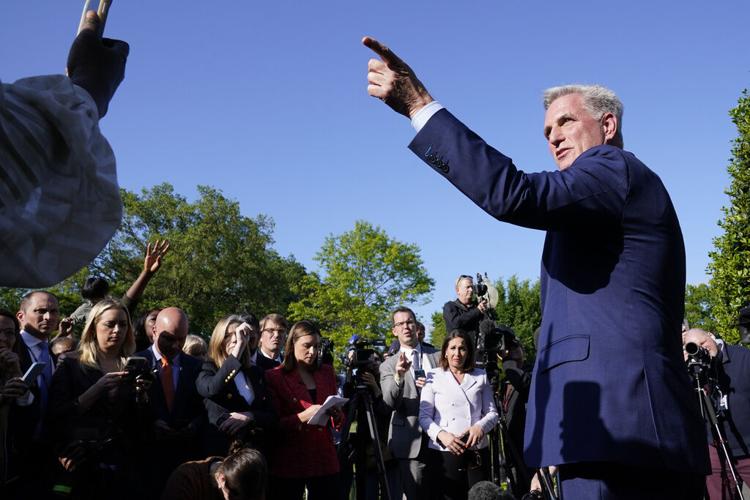
President Joe Biden met with legislative leaders on Tuesday, but neither side gave any indication of progress on the debt ceiling ahead of a potential June 1 default deadline. President Joe Biden met with House Speaker Kevin McCarthy, House Minority Leader Hakeem Jeffries, Senate Majority Leader Chuck Schumer, and Senate Minority Leader Mitch McConnell at the White House. Both sides accused each other of holding the economy hostage in the debt ceiling talks. McCarthy said he didn’t see any progress. Schumer said McCarthy refused to take default off the table and argued that a bipartisan solution was needed. Jeffries said additional meetings were planned. A short-term extension also appeared out of reach. “I don’t think a short-term extension does anything,” McCarthy said after the meeting. McCarthy put the ball in Schumer’s court. “My position is clear and reasonable,” the House Speaker posted on Twitter. “House Republicans have done their job to avoid a default and responsibly raise the debt limit. Democrats must now do the same.” Schumer said any path forward would need bipartisan support. House Republicans recently passed a bill to cut spending by nearly $5 trillion and raise the debt limit by about $1.5 trillion, or until March 31, 2024, whichever comes first. Republicans have said they won’t agree to raise the debt limit without spending cuts. Biden and Democrats have said Congress must raise the debt limit before discussing changes to spending or other budget changes. U.S. Treasury Secretary Janet Yellen said lawmakers must raise the debt ceiling by June 1 or risk a default on U.S. debt obligations. Republished with the permission of The Center Square.
Terri Sewell joins letter urging House Republicans to raise debt ceiling with no strings attached
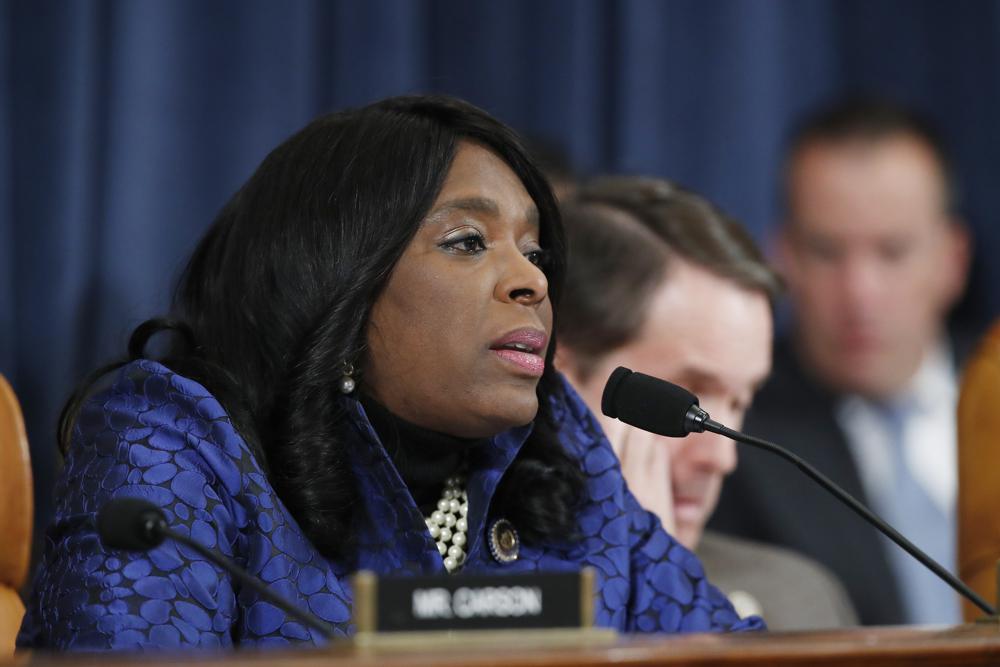
On Wednesday, Congresswoman Terri Sewell joined nearly 200 of her colleagues from across the House Democratic Caucus in a letter to Republican Speaker of the House Kevin McCarthy calling on Republicans to protect the full faith and credit of the United States by lifting the debt ceiling “without any extraneous policies attached.” “It is a sad day when House Republicans shamefully hold our economy hostage and threaten to default on our debt unless Congress makes deep cuts to programs that Alabamians rely on,” said Rep. Sewell. “We in Congress should never play politics with the full faith and credit of the United States of America. Republicans must join us to raise the debt ceiling—just as they did three times under the previous administration—and avoid economic collapse.” “I am a strong believer in balancing our budget,” continued Sewell. “Despite Republicans’ 2017 tax giveaway to the wealthy—which added $2 trillion to our deficit—I am proud of the historic deficit reduction that we have achieved under President [Joe] Biden. If Republicans want to address our national debt, they should start by making the wealthy pay their fair share instead of targeting veteran benefits, food assistance, and other programs that hard-working Alabama families rely on.” On Twitter, Sewell wrote, “I was serving in this very body in 2017 when Republicans added $2 trillion to our deficit to fund tax breaks for the wealthy. I will not support their plan to cut veterans benefits, food assistance, and programs families rely on. Working families should not pay the price!” Democrats on the House Budget Committee claim that the House Republicans’ debt ceiling proposal would: · Threaten access to food assistance for 17,000 people aged 50-55 in Alabama. · Eliminate preschool and childcare for at least 5,600 children in Alabama. · Increase housing costs for at least 8,800 people in Alabama. · Make college more expensive for at least 98,900 students in Alabama. · Eliminate at least three air traffic control towers in Alabama. · Cut at least 150 rail safety inspection days in Alabama. · Repeal investments in cleaner, cheaper energy. They warn that if the U.S. were to default on the debt, it would unleash global economic catastrophe and put vital government services at risk. The Democrats’ report claims that a default would cost about 6,000 jobs in Alabama’s Seventh Congressional District alone. Nationally a default could kill more than 7 million jobs. While Sewell opposed the Republicans’ spending plan, Congressman Barry Moore voted for the Limit, Save, Grow Act, the House Republican plan. According to sponsors, this legislation returns total discretionary spending to fiscal year 2022 levels and eliminates $4.8 trillion in “woke, weaponized, and wasteful” spending over a decade. This legislation also rescinds unspent COVID-19 funding and defunds Biden’s 87,000-strong army of IRS agents. The Limit, Save, Grow Act is sponsored by Budget Committee Chairman Jodey Arrington (Texas). “Biden and the Democrats are spending us into bankruptcy to fund their bloated bureaucracy and acting like cutting spending will bring on the apocalypse,” said Moore in a press release. “The truth is, the Limit, Save, Grow Act saves us $4.8 trillion over ten years, and if we don’t do something to begin tackling our $31 trillion national debt, which mostly belongs to China, the livelihoods of our children and grandchildren are at risk.” The U.S. national debt is $31.7 trillion. The federal government is spending $1.42 trillion a year more than it takes in even though the U.S. is not fighting a war and unemployment is at record lows. To connect with the author of this story or to comment, email brandonmreporter@gmail.com.
House Republicans pass U.S. debt bill, push Joe Biden on spending
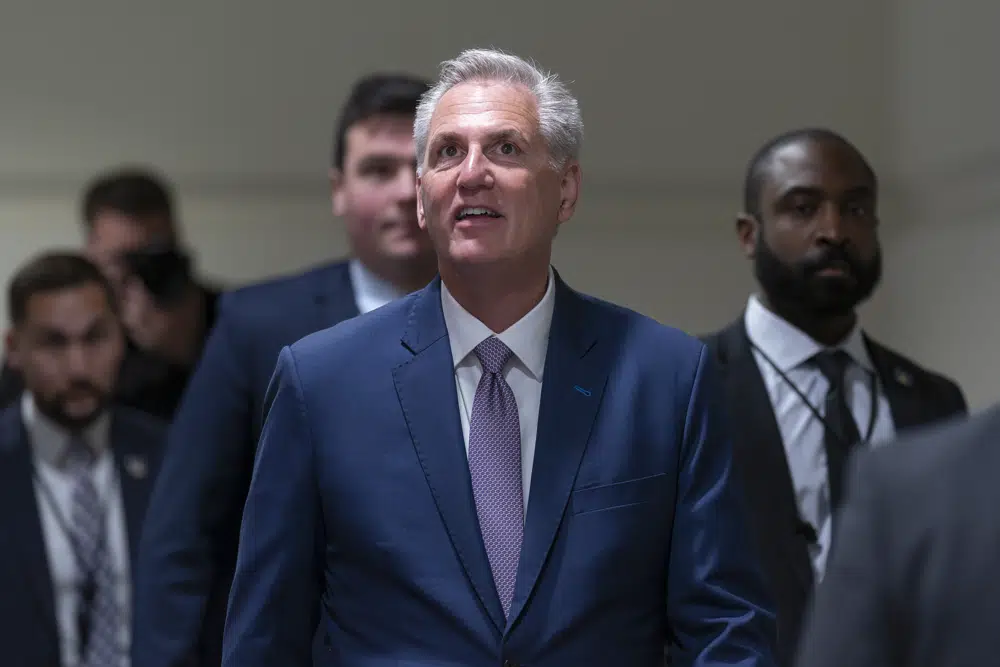
House Republicans narrowly passed sweeping legislation Wednesday that would raise the government’s legal debt ceiling by $1.5 trillion in exchange for steep spending restrictions, a tactical victory for Speaker Kevin McCarthy as he challenges President Joe Biden to negotiate and prevent a catastrophic federal default this summer. Biden has threatened to veto the Republican package, which has almost no chance of passing the Democratic Senate in the meantime, and the president has so far refused to negotiate over the debt ceiling, which the White House insists must be lifted with no strings to ensure America pays its bills. But McCarthy’s ability to swiftly unite his slim majority and bring the measure to passage over opposition from Democrats and even holdouts in his own party gives currency to the Republican speaker’s strategy to use the vote as an opening bid forcing Biden into talks. The two men could hardly be further apart on how to resolve the issue. The bill passed by a razor-thin 217-215 margin. “We’ve done our job,” McCarthy said after the vote. “The president can no longer ignore” the issue by not negotiating with the House Republicans, he declared. As the House debated the measure, Biden on Wednesday indicated he was willing to open the door to talks with McCarthy, but not on preventing a first-ever U.S. default that would shake America’s economy and beyond. “Happy to meet with McCarthy, but not on whether or not the debt limit gets extended,” Biden said. “That’s not negotiable.” Passage of the sprawling 320-page package in the House is only the start of what is expected to become a weekslong political slog as the president and Congress try to work out a compromise that would allow the nation’s debt, now at $31 trillion, to be lifted to allow further borrowing and stave off a fiscal crisis. The nation has never defaulted on its debt, and the House Republican majority hopes to maneuver Biden into a corner with its plan to roll back federal spending to fiscal 2022 levels and cap future spending increases at 1% over the next decade, among other changes. McCarthy worked nonstop to unite his fractious Republican majority, the “five families,” including the conservative Freedom Caucus and others, making post-midnight changes in the House Rules Committee in the crush to win over holdouts. Facing a revolt from Midwestern Republicans over doing away with biofuel tax credits that were just signed into law last year by Democrat Biden, GOP House members relented and allowed the tax credits to stay on the books in their bill. “Our delegation has stood united for Iowa’s farmers and producers fighting to amend the bill to protect biofuels tax credits,” said the four House Republicans from Iowa in a joint statement announcing their support for the bill. Republicans also agreed to more quickly launch the bolstered work requirements for recipients of government aid, starting in 2024 as proposed by another holdout, Freedom Caucus’ Rep. Matt Gaetz, R-Fla., who has led previous challenges to McCarthy. Republicans hold a five-seat House majority and faced several absences this week, leaving McCarthy with almost no votes to spare. In the end the speaker lost four Republican no votes, and all Democrats opposed. “This bill is unacceptable, it’s unreasonable, it’s unworkable, it’s unconscionable — and it’s un-American,” said the Democratic leader Hakeem Jeffries of New York. “That’s why we oppose it.” Democrats derided the Republican plan as a “ransom note,” a “shakedown,” and “an unserious bill” that was courting financial danger. But as McCarthy worked to shore up support, some of the most conservative rank-and-file Republican members who have never voted for a debt ceiling increase in their quest to slash spending said they were preparing to do just that, rallying behind the speaker’s strategy to push Biden to the negotiating table. Rep. Ralph Norman, R-S.C., a member of the Freedom Caucus, said he “wanted double” the deficit savings contained in the bill but would vote for it “because it starts the ball, it gets us in the arena to solve the debt problem.” It’s a first big test for the president and the Republican speaker, coming at a time of increased political anxiety about the ability of Washington to solve big problems amid the need to raise the federal debt limit in a matter of weeks. The Treasury Department is taking “extraordinary measures” to pay the bills, but funding is expected to run out this summer. Economists warn that even the serious threat of a federal debt default would send shockwaves through the economy. In exchange for raising the debt limit by $1.5 trillion into 2024, the bill would roll back overall federal spending and: — Claw back unspent COVID-19 funds. — Impose tougher work requirements for recipients of food stamps and other government aid. — Halt Biden’s plans to forgive up to $20,000 in student loans and — End many of the landmark renewable energy tax breaks Biden signed into law last year. It would tack on a sweeping Republican bill to boost oil, gas, and coal production. A nonpartisan Congressional Budget Office analysis estimated the Republican plan would reduce federal deficits by $4.8 trillion over the decade if the proposed changes were enacted into law. Several Republicans from the party’s right-wing, eager for even stricter spending cuts, said the bill was at least a starting point as they prepared to vote for McCarthy’s strategy and bolster his hand in talks with Biden. Freshman Rep. Derrick Van Orden, R-Wis., said: “It’s our obligation to get Speaker McCarthy to the table.” Others, though, remained noncommittal or flat-out no’s. Rep. Andy Biggs, the former chairman of the Freedom Caucus, said he had wanted Republicans to do more to end deficit spending. Tim Burchett, R-Tenn., said of the nation’s nearly $32 trillion in debt, “That’s my major concern.” In the Senate, leaders were watching and waiting. Senate Majority Leader Chuck Schumer said House passage of the legislation would be a “wasted effort” and that McCarthy should come to the table with Democrats to pass a straightforward debt-limit bill without GOP priorities
Kevin McCarthy preps House GOP debt deal to draw Joe Biden into talks
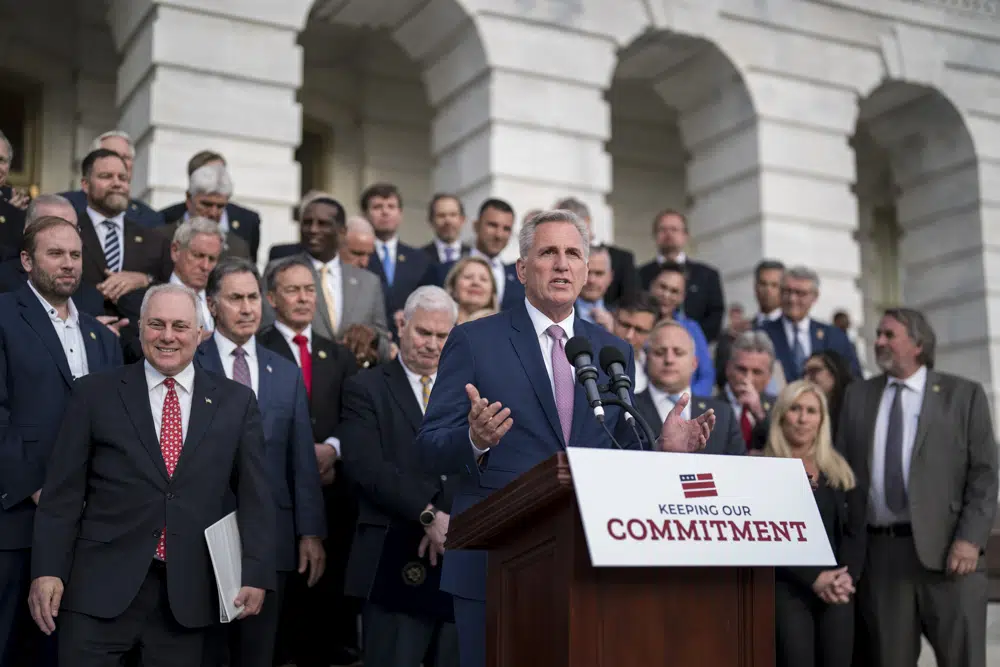
Speaker Kevin McCarthy convened House Republicans behind closed doors Tuesday to build support for his plan to allow the nation’s debt limit to rise in return for strictly limiting future federal spending increases to 1% a year. It’s a bid, including other major policy changes, to draw President Joe Biden into negotiations. The typically fractured House Republican majority has appeared surprisingly open to the plan, which McCarthy outlined in a high-profile speech Monday on Wall Street, but it remains a work in progress. While the proposal has almost no chance of passage in the Democratic Senate, McCarthy wants to pass it in the Republican House to kickstart White House talks. “I’m confident we’ll have it and comfortable we’ll pass it,” said Rep. Tom Cole, R-Okla., the chairman of the Rules Committee, who said a bill could come up for a vote as soon as next week. Even some of McCarthy’s skeptics from the House Freedom Caucus — including those who initially refused to back him to be speaker — seemed ready to give his debt ceiling proposal a look. But others remained deeply skeptical, showing the limits of the embattled speaker’s grip on his majority. Rep. Matt Gaetz, R-Fla., a McCarthy holdout for speaker, said Tuesday he was unsold on the plan and suggested changes. And Rep. Clay Higgins, R-La., said as he exited the session, “There is no ‘this.’ We’re discussing what the ‘this’ will be.” The nation’s legal debt limit must be raised soon to keep the U.S. from defaulting on its fiscal obligations. That high-stakes fight will play out in the weeks ahead as Biden confronts the new era of divided government with Republicans in charge of the House and eager to flex their majority power. If McCarthy succeeds in having the House pass his proposal, he would be able to enter into talks with the White House, showing that he has the backing of his fellow GOP lawmakers. Biden administration officials have privately expressed doubts about the benefits of negotiating with McCarthy out of skepticism that he can rally conservative Republican votes. Democratic Minority Leader Hakeem Jeffries quipped on CNBC that the House Republicans’ budget plan is “in the witness protection program.” The proposal the Republican speaker outlined is far-reaching and expected to be rejected by the White House. It would raise the debt limit into next year — putting it squarely into the 2024 presidential election in exchange for rolling back spending to fiscal 2022 levels, recouping tens of billions of dollars of unspent COVID-19 relief funds, and imposing a 1% cap on future non-defense spending each year for the decade. The 1 percent spending cap would not include mandated Social Security and Medicare money. Additionally, McCarthy’s plan would impose new work requirements on recipients of government aid, cutting billions from the federal safety net. And it would tack on H.R. 1, a sweeping energy package of oil and gas drilling and permit changes that would undo much of Biden’s climate change agenda. The Treasury Department has said the government probably will need to raise the debt ceiling, now at $31 trillion, by summer. For now, Treasury is taking “extraordinary measures” to allow continued borrowing to pay off already accrued bills, but that will eventually run out. Unable to pass an actual Republican budget through the House, as Biden challenges him to do, McCarthy instead has been working furiously behind the scenes with his leadership team to unite the “five families” — the often warring factions of Republican caucuses, including the House Freedom Caucus — to join together on his new plan. He and the leadership team discussed the ideas Tuesday at the House Republicans’ private session in hopes of turning the slides of ideas into a firm legislative package. “I find all indications to be we’re going to put a very serious proposal on the floor and pass it with 218 or more votes,” said Freedom Caucus member Rep. Dan Bishop, R-N.C., as lawmakers arrived at the Capitol late Monday evening, referring to the majority needed for passage. But by Tuesday, no vote was set, according to a person familiar with the private meeting and granted anonymity to discuss it. “I still have more questions than answers at this point,” said Rep. Nancy Mace, R-S.C., complaining there were only a few slides of information. In many ways, this is the easy part for McCarthy: A vote as soon as next week would hardly be binding since the proposal would be dead on arrival in the Senate. That political dynamic may make it easier for McCarthy to rally his ranks behind the plan if Republicans see it as merely a starting point in negotiations designed to push Biden to the table. House Freedom Caucus Chairman Rep. Scott Perry, R-Pa., said late Monday the plan was a step in the right direction, but he still needed details. “Kevin McCarthy is going to get 218 votes on this deal,” said Rep. Dusty Johnson, R-S.D., a chairman of the conservative Main Street Caucus, referring to the majority needed for passage. Said Rep. Kevin Hern of Oklahoma, the chairman of the powerful Republican Study Committee: “There’s still hard work ahead of us, but I believe we can get 218 votes by the end of next week.” Senate Majority Leader Chuck Schumer said if McCarthy continues down this path of negotiating over the need to raise the debt limit, the U.S. would be headed for a default. “No one should confuse this wish list as anything more than a recycling of the same bad ideas we’ve heard about for weeks, and it’s still not clear that Speaker McCarthy has the votes to even pass this,” Schumer said. Republished with the permission of The Associated Press.
House GOP pushes sprawling bill to ‘unleash’ American energy

House Republicans are set to approve a sprawling energy package that seeks to undo virtually all of President Joe Biden’s agenda to address climate change. The massive GOP bill up for a vote Thursday would sharply increase domestic production of oil, natural gas and coal, and ease permitting restrictions that delay pipelines, refineries, and other projects. It also would boost production of critical minerals such as lithium, nickel, and cobalt that are used in products such as electric vehicles, computers, and cellphones. Republicans call the bill the “Lower Energy Costs Act” and have given it the symbolic label H.R. 1 — the top legislative priority of the new GOP majority, which took control of the House in January. The measure, which combines dozens of separate proposals, represents more than two years of work by Republicans who have chafed at Biden’s environmental agenda. They say Biden’s efforts have thwarted U.S. energy production and increased costs at the gas pump and grocery store. “Families are struggling because of President Biden’s war on American energy,″ said House Majority Leader Steve Scalise, R-La., one of the bill’s main authors. “We have way too many energy resources here in America to be relying on hostile nations and paying (high prices) at the pump.″ The GOP bill will “unleash those resources so we can produce energy in America,″ Scalise said. “We don’t have to be addicted to foreign countries that don’t like us.″ Democrats called the bill a giveaway to big oil companies. “Republicans refuse to hold polluters accountable for the damage they cause to our air, our water, our communities, and our climate,″ said New Jersey Rep. Frank Pallone, the top Democrat on the House Energy and Commerce Committee. “While Democrats delivered historic wins for the American people by passing historic climate legislation, Republicans are actively working to undermine that progress and do the bidding of their polluter friends,″ Pallone said. Biden has threatened to veto the energy bill if it reaches his desk, and Senate Majority Leader Chuck Schumer, D-N.Y., called it “dead on arrival” in the Democratic-controlled Senate. House Speaker Kevin McCarthy, R-Calif., said the GOP bill “restores American energy leadership by repealing unnecessary taxes and overregulation on American energy producers,″ and “makes it easier to build things in America″ by placing a two-year time limit on environmental reviews that now take an average of seven years. “Every time we need a pipeline, a road or a dam, it gets held up five to seven years and adds millions of dollars in costs for the project to comply with Washington’s permitting process,″ McCarthy said in a speech on the House floor. “It’s too long, it’s unaffordable, it’s not based on science, and it’s holding us back.″ He pointed to a project to modify and improve Lake Isabella Dam in his central California district that has lasted 18 years and still is not completed. “Permitting reform isn’t for everyone,″ McCarthy added. “If you like paying more at the pump, you don’t want to make it faster for American workers to build more pipelines. If you’re China, you’d rather America sit back and let others lead. And if you’re a bureaucrat, maybe you really do enjoy reading the 600-page environmental impact studies.″ Most Americans want lower prices and more U.S. energy production, McCarthy said — results he said the bill will deliver. Democrats called that misleading and said the GOP plan was a thinly disguised effort to reward oil companies and other energy producers that have contributed millions of dollars to GOP campaigns. Arizona Rep. Raul Grijalva, the top Democrat on the House Natural Resources Committee, derided the bill as the “Polluters Over People Act″ and “a nearly 200-page love letter to polluting industries.″ Instead of reining in “Big Oil” companies that have reported record profits while “hoarding thousands of unused leases″ on public lands and waters, the GOP bill lowers royalty rates paid by energy producers and reinstates noncompetitive leasing of public lands, Grijalva said. The bill also gives mining companies “a veritable free-for-all on our public lands” and “makes a mockery of tribal consultation″ required under federal law, he said. Under the GOP plan, mining companies will “destroy sacred and special places” throughout the West, “ruin the landscape and leave behind a toxic mess that pollutes our water and hurts our health — all without paying a cent to the American people,″ Grijalva said. Schumer called the measure “a giveaway to Big Oil pretending to be an energy package.” The House energy package “would gut important environmental safeguards on fossil fuel projects,″ locking America “into expensive, erratic and dirty energy sources while setting us back more than a decade on our transition to clean energy,″ Schumer said. Schumer said he supports streamlining the nation’s cumbersome permitting process for energy projects, especially those that will deliver “clean energy” such as wind, solar and geothermal power. “But the Republican plan falls woefully short on this front as well,″ he said, calling on Republicans to back reforms that would help ease the transition to renewable energy and accelerate construction of transmission lines to bolster the nation’s aging power grid. Schumer and other Democrats said the Republican bill would repeal a new $27 billion Greenhouse Gas Reduction Fund and other parts of the climate and health care law passed by Democrats last year. The bill also would eliminate a new tax on methane pollution. Republished with the permission of The Associated Press.
Dan Sutter: A national divorce and economic policy

Comments from U.S. Representative Marjorie Taylor Greene have brought attention to the idea of a national divorce. A national divorce would enable the enactment of the economic agendas of the left and right and is worth thinking about. National dissolution has been broached via calls for secession following the 2012 and 2016 elections. Michael Anton of the Claremont Institute, author of the influential essay “The Flight 93 Election,” recently penned a brilliant dialogue on national divorce for The Asylum. The dialogue is between childhood friends Tom and Malcolm, who have grown apart on ideological grounds. Tom recognizes how Blue state residents, including his former friend Malcolm, hate everything about Red state conservatives. If this were a marriage, the spouses would be separated and talking exclusively through insults. Why not end this nightmare marriage peacefully? Malcolm’s not unexpected dismissal of national dissolution leads Tom to wonder, if Blue America so hates everything Red, why not break up? The answer: Blue America intends to subjugate and rule folks like Tom through legal manipulation, if not outright force. Mr. Anton notes Abraham Lincoln’s observation that North and South shared 99 percent of values and differed only over one thing. That one thing, slavery, was a doozy, but other common values offered potential for continued union. And Lincoln was right; after a terrible Civil War ended slavery, we eventually healed back into a United States. Today’s differences are far more extensive, including economic policy (taxes, spending, and regulation), the form of government (the desirability of the Constitution), and culture (religion, abortion, parental rights, etc.) Red and Blue America seemingly cannot even agree on who is a woman! A divorce differs from secession in being mutual. Precedent for peaceful dissolution exists, most notably division of Czechoslovakia into the Czech Republic and Slovakia in 1992. What is the alternative to a divorce? Polls suggest that many Americans fear civil war or descent into authoritarian rule. When the FBI investigates parents speaking at school board meetings as domestic terrorists, we may already no longer be a liberal democracy. To be clear, some polls indicate more common ground between Americans than suggested by MSNBC and Fox News. During the selection of Kevin McCarthy as Speaker of the House, television cameras caught Democrats and Republicans talking cordially to each other! Pursuit of clicks and followers may drive the news media to be excessively venomous. A national divorce offers benefits and not just avoid conflict. Economists view nations in terms of institutions, things like property rights, the rule of law, and constitutional limits on government. Red and Blue America want different institutions, not just slightly more or less government spending. America was founded on freedom, which in 1776 meant not being ruled by a king. Multiple visions of freedom have since evolved. Liberals (generally) favor economic rights and expansive government to liberate people from necessity. Conservatives and libertarians want limited government and view high taxes as negating freedom. One nation cannot have two sets of institutions. Government cannot both spend half of the GDP and only 10 percent of the GDP. We cannot have government control of the economy and free markets. Pinballing between these extremes every four or eight years might be even worse. Perhaps we just need to decide the correct vision of freedom. This has not worked. We are no closer to consensus now than fifty or one hundred years ago. Waiting for consensus means never implementing either vision. The seeming authoritarian turn in American politics reflects, I think, an unwillingness to never achieve our preferred vision of freedom. Blue and Red America see each other as preventing the realization of a just America. Yet the only true barrier to implementing both visions is remaining one nation. Perhaps America is still the land of the free, but we embrace different and incompatible visions of freedom. Should we never implement either due to a lack of consensus, have half the country try to force their vision on the other, or try to realize both through mutual separation? Daniel Sutter is the Charles G. Koch Professor of Economics with the Manuel H. Johnson Center for Political Economy at Troy University and host of Econversations on TrojanVision. The opinions expressed in this column are the author’s and do not necessarily reflect the views of Troy University.
Gary Palmer warns, “China is the existential threat”

On Saturday, Congressman Gary Palmer spoke with the Mid-Alabama Republican Club (MARC) at their monthly meeting in the Vestavia Hills Public Library. Palmer spoke to the gathering of greater Birmingham area Republicans about several topics, including foreign policy. Palmer supports aiding Ukraine in its war with Russia but warned that “China is the existential threat” we face. “China is the existential threat,” Palmer warned. Palmer said that anything the economy needs for defense or to keep the U.S. economy functioning should not be made in a country that is an enemy. Anything essential that is produced in China cannot stay in China. “No nation should be dependent on an enemy nation for something they need,” Palmer said. “Frankly, we can’t bring back everything.” “What I have been proposing is that we form a western hemisphere prosperity act,” with willing nations in Central and South America as well as Canada, Palmer said. Palmer said that our European allies made a mistake by investing so heavily in renewable energy and then relying on Russia to provide most of their energy needs because now that Russia is causing problems, shutting off the flow of Russian gas and oil is problematic for those nations. Palmer said that while the U.S. and Western European Countries have limited their domestic energy options, “China is building a coal-fired plant every two weeks, but they are building 14 outside of China, particularly in sub-Saharan Africa and South America.” Palmer said he had been asked to discuss his ideas in Brussels, Belgium, and would probably accept that invitation. “We cannot stop helping Ukraine,” Palmer said. “The consequences would be worse than pulling out of Afghanistan.” Palmer said the unilateral U.S. decision to pull out of Afghanistan has severely weakened U.S. credibility worldwide. “World leaders don’t trust us,” Palmer warned. “Our allies don’t trust us, and our enemies don’t fear us. That is the consequence of pulling out of Afghanistan.” Palmer said that if we had not supported Ukraine, the Russians would have taken it and that Russian President Vladimir Putin would not have stopped there. “They would have taken Moldova, they would have taken the Republic of Georgia, and they would have taken the Baltics, and we would be in another Cold War,” Palmer said. Palmer said that it is a mistake for the U.S. to transition off of oil and natural gas and said that renewables would never be able to produce all of the energy that we need. One alternative is nuclear power. “One nuclear power plant takes up about 640 acres,” Palmer said. “To produce the generating capacity of one nuclear power plant would take 67,000 acres of wind turbines.” “We will have to pass a debt limit bill,” Palmer said. “We cannot default on the debt.” Palmer assured the Republicans that in order to address the debt ceiling, President Joe Biden would have to negotiate with Speaker of the House Kevin McCarthy and Senate Minority Leader Mitch McConnell and make concessions to the Republicans. Palmer announced when questioned by Terry Richmond that he would run for office again in 2024, breaking a pledge not to serve over ten years that he made when he first ran for office in 2014. “We all have a mission,” Palmer said. “I don’t think my mission is complete.” “There is no way we can be bound by any agreement that the Biden Administration makes unless it is ratified by the Senate,” Palmer said when asked about foreign agreements made by President Biden. “We are still committed to getting the Northern Beltline built,” Palmer said, referring to the beltway around Northern Jefferson County. “We have got $469 million in funding for that. We had a meeting with ALDOT in my office on that. They committed $120 million for that, but there is no seed money for it. It is frustrating.” The MARC meets monthly on the second Saturday of each month at 8:30 a.m. At this point, Gary Palmer is the only formally announced candidate for the Sixth Congressional District seat. To connect with the author of this story or to comment, email brandonmreporter@gmail.com.
Steve Flowers: Our congressional delegation has garnered good committee assignments

For the past several decades, Alabama’s power has been centered around the U.S. Senate – primarily because of Richard Shelby’s immense power and influence. During Senator Shelby’s 36-year tenure, he chaired the Intelligence, Banking, and Rules Committees. However, he became immensely powerful his last six years as Chairman of the Appropriations Committee. Shelby practically moved Washington to Alabama when it came to bringing home procured earmarked funds to the Heart of Dixie. We received more federal funding than any state in America. National publications labeled Shelby the Greatest Pork King in federal history, surpassing the late Senator Robert Byrd of West Virginia. Less we forget, Shelby also had a very respected and tenured wingman in Senator Jeff Sessions, who served with distinction for 20 years in the Senate. They were a great team. In the halls of Congress, and especially in the U.S. Senate, seniority equates to power, and we had it. However, we who follow Alabama politics have been cautioning you that our day of reckoning would arrive in January 2023, when Richard Shelby retired from the Senate, and that day has arrived. Alabama will never be able to raid the federal vault like Shelby has done. Fortunately, as he was walking out the door, he brought so much largesse home with him that it will take other states ten years to catch up. Under the U.S. Senate seniority system, it will take young Katie Britt about ten years before she will have any impact and influence in the Senate. Katie Britt took office with zero years seniority, and that places her 99th in seniority status in the U.S. Senate. Our senior U.S. Senator, Tommy Tuberville, has two years seniority. That places him 89th in seniority in the 100-member Senate. However, we have several members of our U.S. House delegation who are garnering some seniority and are emerging as powerful members of the lower body. Therefore, for at least the next decade, our power in Washington will be in the U.S. House of Representatives. Jefferson/Shelby 6th District Congressman Gary Palmer (R-Hoover) has been instrumental in helping to garner extremely good committee assignments for our six Republican members of Congress. Palmer, who is a quiet, policy-issues congressman, was the founder and leader of the Alabama Policy Institute prior to going to Congress. Therefore, it was apropos that he would gravitate to the 30-member Republican Party Steering Committee. This committee has emerged as a powerful entity in the past decade. They essentially chose the House Committee Assignments along with Speaker Kevin McCarthy. Congressman Gary Palmer will serve as Chairman of the House GOP Policy Committee. He will also retain his position on the House Energy and Commerce Committee. This committee has jurisdiction over healthcare, which is vital to UAB – the heart and soul of the 6th District. Congressman Robert Aderholt (R-Haleyville) is our senior Congressman. He got to Washington at a very young age. He is now only 57 years old and has 28 years seniority. He is one of the cardinals on the House Appropriations Committee and is now chairman of the Subcommittee on Labor, Health, and Human Resources. This committee will be very important to Alabama because of the biomedical research going on in Birmingham and Huntsville. If the Republicans maintain their majority into 2025, Aderholt is in line to become Chairman of the House Appropriations Committee. Congressman Mike Rogers (R-Saks/Anniston) has emerged as Chairman of the House Armed Service Committee. This is a very important coup for Alabama and an impressive appointment for Mike Rogers. The U.S. Military has a very large footprint and importance in the Heart of Dixie. Defense dollars dominate Alabama’s economy. In addition to Rogers, two of our newest members of Congress have scored seats on the Armed Services Committee – Representative Jerry Carl (R-Mobile) and Representative Dale Strong (R-Huntsville). Both Carl and Strong are bright stalwart stars for our congressional delegation. They have also become close friends and allies. In addition to garnering a seat on the Armed Services Committee, Jerry Carl has been placed on the Appropriations Committee. He will be a workhorse for his coastal Alabama district. Freshman Congressman Dale Strong’s appointment to the Armed Services Committee is a great feather for Strong, given the importance of the Redstone Arsenal and the immense amount of defense dollars in Huntsville. Representative Barry Moore (R-Enterprise) landed an appointment to the prestigious Judiciary Committee. Alabama’s lone congressional Democrat, Representative Terri Sewell, will retain her position as Chief Deputy Whip within the Democratic caucus. Sewell will also continue to serve on the powerful and prestigious House Ways and Means Committee. The paradigm of our power in Washington has moved to the U.S. House of Representatives. See you next week. Steve Flowers is Alabama’s leading political columnist. His weekly column appears in over 60 Alabama newspapers. He served 16 years in the state legislature. Steve may be reached at: www.steveflowers.us.
Steve Marshall leads 15 AGs, urging Congress to limit, rescind federal emergency powers
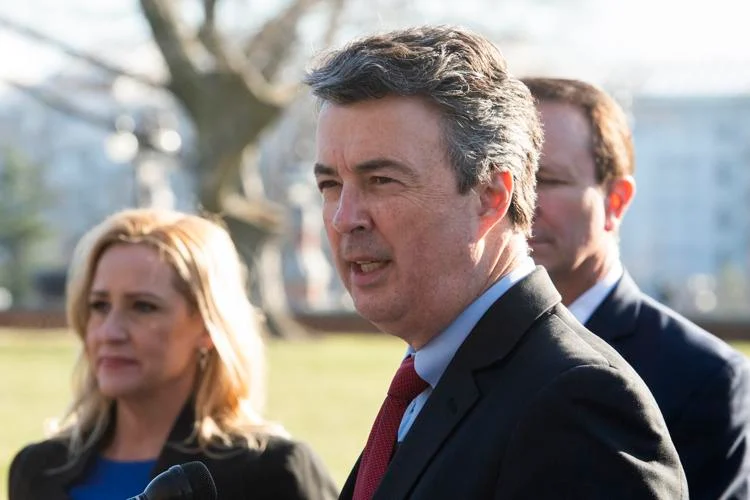
Sixteen attorneys general are urging members of Congress to modify, clarify, and rescind an emergency-use authorization authority still being used by federal agencies to mandate coronavirus-related policies. The letter sent at the end of January to House Speaker Kevin McCarthy and House Committee on Energy & Commerce Chair Cathy McMorris Rogers, both Republicans, relates to curtailing the authority of the U.S. Department of Health and Human Services and Food and Drug Administration. The AGs have requested that Congress override existing emergency-use authorization policies still in effect and to conduct rigorous oversight to establish what mistakes were made related to current and past implementation of the federal authority. They also asked Congress to “consider revising the liability protections provided by a prior Congress, and confirm what President [Joe] Biden has admitted and what the American people in their sound judgment know: any valid grounds for claiming a state of medical emergency due to COVID have ended; normalcy and the rule of law must be restored.” Led by Alabama Attorney General Steve Marshall, the coalition represents the states of Alaska, Arkansas, Idaho, Indiana, Iowa, Kansas, Kentucky, Louisiana, Mississippi, Montana, Nebraska, South Carolina, Tennessee, Texas, and Utah. Texas Attorney General Ken Paxton, who has sued the administration over its COVID-related mandates, said the Biden administration “has attempted to use the pandemic as a pretext for instituting a number of unrelated left-wing policy objectives. HHS and FDA have also abused the emergency powers to force vaccine injections, which can have severe, adverse side effects on young children and healthy adults even though they are the least likely to be impacted by Covid-19.” The attorneys general argue that HHS and FDA continue to misuse the authority granted to them for times of emergency, specifically relying on emergency powers “to justify numerous uses of novel vaccines that are not only failing to halt the transmission of COVID but are also exposing young people (who are least likely to be harmed by COVID) to unnecessary risks,” the letter states. “Shockingly,” they write, “the FDA is still invoking its emergency use authorization authority to push [COVID-19] vaccines out to infants.” The agencies are doing so after Biden said “the pandemic is over” last September. He told 60 Minutes, “the pandemic is over. We still have a problem with COVID. We’re still doing a lot of work on it. But the pandemic is over. If you notice, no one’s wearing masks. Everybody seems to be in pretty good shape, and so I think it’s changing …” He made the remarks after his administration had sought for months to add another roughly $22 billion to the Omnibus spending bill to fund COVID-related programs, NPR reported at the time. Despite these claims, the president and his administration are using emergency use authorization to justify “an unprecedented expansion of executive power.” “From student loan forgiveness to a moratorium on evictions, the President and his Administration continue to attempt to push through an authoritarian agenda based on an emergency that, according to the President, does not exist,” the AGs wrote. “The idea that we are still in the midst of a medical emergency flies in the face of the facts on the ground. Yet, HHS and FDA continue to perpetrate the myth that an emergency exists to aggrandize their power at the expense of people’s freedom.” They also called on Congress to clarify and amend the various statutory emergency authority provisions the agencies “have abused in their unrealistic and impractical quest to operate under emergency authority indefinitely” and to “narrow unilateral authority that agencies and the president have during times of emergency.” They urged Congress “to move quickly” to “override any remaining emergency use authorizations for COVID vaccines, consider reforms to the sweeping liability shield created in 2005, and ensure that our liberties and system of government are robustly protected against any such future attempts at medical tyranny.” Republished with the permission of The Center Square.


